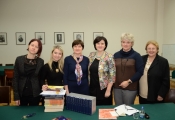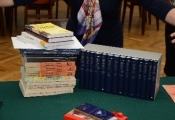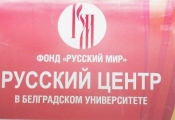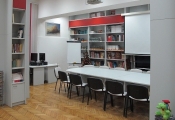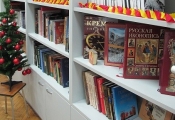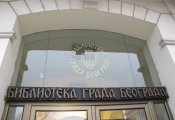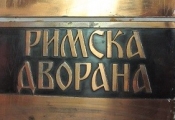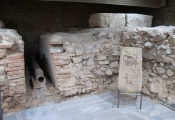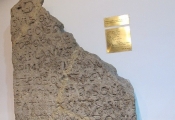17 December 2015 in the capital city of the Republic of Serbia there took place the ceremony of opening a Virtual reading room of the Russian State Library at the territory of the Philological Faculty of the University of Belgrade. The event was held due to the partner project of the Russian State Library and foundation “Russkiy Mir”.
The origin of the University of Belgrade can be traced down to the beginning of the 19th century, when Dositej Obradović founded the College in 1808. Thirty years later, the Lyceum was founded in Kragujevac. Transferred to Belgrade in 1841, the Lyceum opened its Law Department, in addition to the already existing Philosophy Department. On September 24, 1863, the Law on the Advanced School Founding was adopted. It was by power of this law that the Lyceum was transformed into the Higher School. Then it could boast of three departments, i.e. of Law, of Philosophy and of Technology. The university developed up to the occupation by the fascist army in 1941. In 1945 the number of the departments of the university continued growing. Under the auspices of the university there were founded universities in Novi Sad, Niš, Priština, Kragujevac and what is today Podgorica. We can say that the University of Belgrade was alma mater to nearly all the universities throughout Serbia, Montenegro, Bosnia and Herzegovina and Macedonia.
The University Library consists of the two independent libraries of the Faculties of Philology and Philosophy. The library of the Faculty of Philology includes seventeen departments divided according to the linguistic principles – Serbian Literature and Russian, Russian and South – Slovenian and General Linguistics, Slavonic Studies, Romance Studies, the Romanian Language and Literature, Italian, Iberian Studies, English, German and Scandinavian Studies, the Albanian Language and Literature, Eastern Technics, General Literature and Theory of Literature, Library and Computer Studies, Hungarian Studies. Each of those departments buys and stores literature, works over the acquired editions, lends them to readers and performs all other librarian functions autonomously. Cooperation of the libraries of the faculty is realized by means of the COBISS system.
Interesting numbers:
- Total collection of the library of the Faculty of Philology comprises 269,913 items;
- Total number of separate reading rooms is 15;
- Total number of readers is 16,200, the 1,200 of whom are teachers and researchers and 15,000 are students;
- Annual acquisition of the collections of the library counts approximately 18,400 items.
In order to participate in the opening ceremony, the Philological Faculty of the University of Belgrade was visited by the Russian delegation which included head of the Administrative department of management and monitoring service for clients (UFKS) of the RSL Nina Avdeeva, head of the Department of prospective development (OPR) Tatyana Blinova and the representative of the “Russkiy Mir” foundation Svetlana Scherbakova.
The arriving guests were accepted by the dean of the Faculty of Philology of the University of Belgrade Dr. Aleksandra Vraneš. Later on there took place the guests’ meeting with the following representatives of the Philological Faculty: Dr. Ljiljana Marković, vice dean for financial matters, Dr. Ljiljana Bajić, vice dean for curriculum, and Boyana Sabo, head of the Russian Centre. They discussed questions of stocking and preserving collections of the libraries of the faculty, and also the problems of education, of developing independent projects realized at the faculty, and participation of the specialists of the faculty in thematic events.
Thus, for participation in book fair in Russia, the faculty was thanked by the head of the Federal Agency for Print and Mass Communications M. Seslavinsky, and it also got a letter of appreciation from the Russian Book Union.
In conclusion the dean of the Faculty of Philology of the University of Belgrade Dr. Aleksandra Vraneš presented the Russian State Library with 31 book edited by the projects of the faculty.
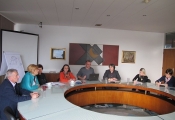 |
In continuation of the day the Russian guests visited the National Library of Serbia. They participated in the discussion with the following specialists of the library: Vesna Stevanović, vice head of the National Library in research work (head of a sector of the Virtual Library of Serbia); Ivana Nikolić, head of the Department of Selective Purchase; Miroliub Stoyanović, head of the Department of the Development of Digitized National Library of Serbia in Belgrade; Snezhana Furunzhiić, head of the Department of work with readers of the National Library of Serbia in Belgrade;
Milan Svetić, head of the Service of technical support. The discussion was devoted to the problems of preservation of collections of national libraries, of service for readers, of implementation of information technologies into work of libraries. From the Russian State Library, Nina Avdeeva presented the National Library of Serbia with a gift album on the history of the Russian State Library from 19
th century and up to the modern times. The official part of the meeting having been over, the Russian guests were offered an excursion around the reading rooms of the National Library of Serbia. They were told about the history of the library and its services and shown its main one and specialized reading rooms.
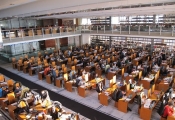 |
The National Library of Serbia was founded in 1832. It is the oldest cultural institution in Serbia. It was created as a special depository of books, then as a library within the Ministry of Education, and since then the library gathered many libraries, public and state authorities and bought out several private libraries ( Lukijan Mušicki, Josip Schlesinger), which have grown over time into the National Library. The Press Law and the new National Library Act from 1919 provided the library with the status of the central state library and the right to acquire legal deposits from the entire territory of the Kingdom of Serbs, Croats and Slovenes. During Second World War Belgrade was intensively bombed, and the library itself was burnt to the ground. A great part of the holdings, catalogues and inventory, were destroyed at that time. The reconstruction of the library holdings began during the war, and was intensified after the war.
Nowadays the National Library of Serbia is a largest and most modern centre possessing a physical collection of 1.5 million editions and an impressive digital collection of over 1.200 thousand documents, among which there could be found old and rare books, literary and other manuscripts and archives, cartographic materials, printed music and sound records, photographic documents, engravings and art materials, posters and small documentary materials, memorial libraries and legacies, etc. The activities of the library embraces international cooperation as well. It participates in such projects as “Europeana”, Tempus”, “IFLA”, etc.
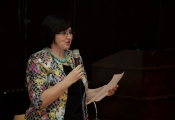 |
The ceremony of opening a VRR RSL at the University of Belgrade was held in the afternoon 17 December 2015. The event gathered over 40 participants, among whom there were: the representative of the “Russkiy Mir” foundation Svetlana Scherbakova, the dean of the Faculty of Philology of the University of Belgrade Dr. Aleksandra Vraneš, the representatives of the Russian State Library, i.e. head of the UFKS Nina Avdeeva and head of the OPR Tatyana Blinova, as well as head of the Russian Centre in Belgrade Boyana Sabo, representatives of the National Library of Serbia and of the University Library, together with students, post – graduates, teachers and lecturers of the university.
The ceremony was opened by the greeting word of the dean of the Faculty of Philology Dr. Aleksandra Vraneš. From the “Russkiy Mir” foundation the audience was greeted by Svetlana Scherbakova, regional director of the Russian programmes. She handed a gift edition to Aleksandra Vraneš.
From the RSL, the participants were greeted by Nina Avdeeva, head of UFKS RSL and of DDL RSL project. She presented the Philological Faculty of the University of Belgrade with a gift edition of “Miortviye Dushi” (“Dead Souls”) by N.V.Gogol from the Russian State Library. Besides, Nina Vldadimirovna prepared a report with a presentation devoted to the digital resources of the Russian State Library. She also spoke about the partner project of the RSL and “Russkiy Mir” foundation. Her speech concluded, Nina Avdeeva answered the questions of the audience. The interpretation of her speech into Serbian was masterfully realized by head of the Russian Centre of the University of Belgrade Boyana Sabo.
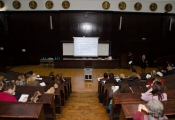 |
In the end the dean of the Faculty of Philology Aleksandra Vraneš was handed a “Virtual Reading Room of the Russian State Library” plaque, thus from that moment everybody could access full texts of the documents of the Digital Dissertation Library of the Russian State Library (DDL RSL) at the territory of the Faculty of Philology of the University of Belgrade.
A great help with organizing VRR RSL was performed by: the dean of the Faculty of Philology of the University of Belgrade Aleksandra Vraneš, representatives of the RSL Nina Avdeeva and Tatyana Blinova, regional director of the Russian programmes of the “Russkiy Mir” foundation Svetlana Scherbakova and head of the Russian Centre of the University of Belgrade Boyana Sabo.
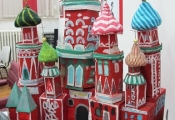 |
The Russian Centre created at the Faculty of Philology of the University of Belgrade is a nook of Russian world where students can study and practise Russian. The staff of the centre prepare and hold events devoted to the Russian culture and literature, they also organize different traveling exhibitions, which would often take place at pre - school establishments and schools of Belgrade as well. Children are actively involved into the studies of the Russian language, and they would participate in the events with great pleasure and pure interest. Thus, kindergarten "Povratak prirodi" ("Returning to Nature") presented the centre with a miniature cathedral of Pokrov Bozhiyey Materi na Rvu (Vesture of the Virgin by the Trench), or the Sobor Vassiliya Blazhennogo (Cathedral of Basil the Blessed), which is situated at the Krasnaya Ploschad (Red Square) in Moscow. Paper waste had been chosen as the ecology-wise material for the present.
Additionally for the Russian guests there was organized an excursion to the Central Library of Belgrade where there was demonstrated a unique culture level left by the Ancient Romans – an aqueduct, a part of a reinforced masonry and artefacts.

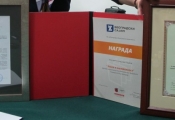

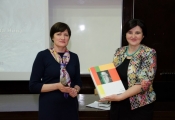
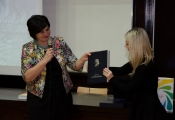




 Virtual Keyboard
Virtual Keyboard
 по-русски
по-русски

